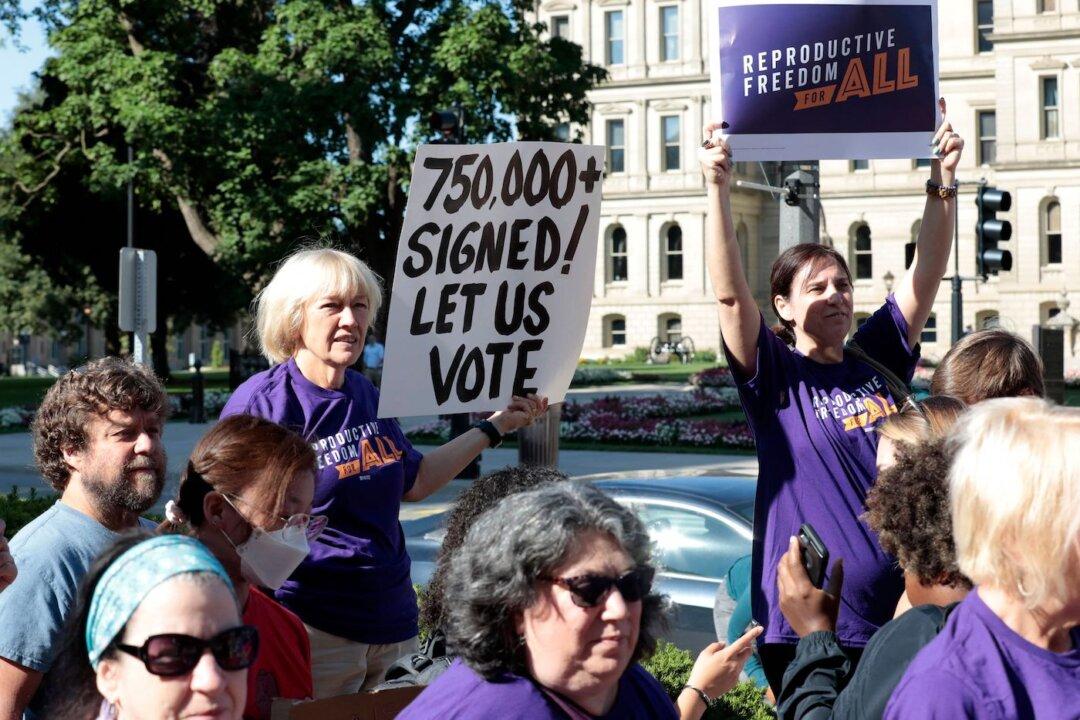Michigan voters have adopted a ballot measure that maintains access to abortion as a state constitutional right, while Kentucky voters rejected a proposed amendment that would have declared there’s no state constitutional right to abortion.
The Michigan and Kentucky measures were two of five related to abortion that went before voters during the Nov. 8 midterm elections.
California and Vermont voters joined those in Michigan in approving a ballot measure that maintains or expands access to abortion.
In Montana, a “born-alive infants regulation” was rejected by voters, joining Michigan in failed attempts to adopt restrictive measures.
The Nov. 8 results appear to affirm the then-surprising rejection of the Kansas Value Them Both Amendment in an Aug. 2 special election. Kansas voters were presented with a constitutional proposal on their primary ballots that declared that there’s no constitutional right to abortion.
The proposal was the first abortion-related vote after the June 24 release of the U.S. Supreme Court’s 6–3 verdict that overturned 1973’s Roe v. Wade decision and returned regulation of the procedure to states.
Nearly 60 percent of Kansas voted against the amendment, a resounding victory by more than 18 percentage points that buoyed Democrats’ midterm election campaign platforms and appeared to set a trend in reluctance by voters—even a significant number who consider themselves to be conservative and “Pro-Life”—to impose restrictions on adult women.
The “Michigan Right to Reproductive Freedom” measure earned its place on the ballot by securing at least 735,000 registered voter signatures.
The measure repeals a 91-year-old state law and creates a state constitutional right “to make and effectuate decisions about all matters relating to pregnancy, including but not limited to ... contraception, sterilization, abortion care.”
The measure, known as Proposal 3, was approved with nearly 2.48 million votes, or 56.7 percent, with 90 percent of ballots counted, the Michigan Secretary of State’s Office said.
As in Kansas, Kentucky lawmakers placed their proposed “no right to abortion” constitutional amendment on the Nov. 8 ballot.
Amendment 2, dubbed the Yes for Life Amendment, asked voters to answer “yes” or “no” to a proposed amendment that states: “To protect human life, nothing in this Constitution shall be construed to secure or protect a right to abortion or require the funding of abortion.”
The measure failed, as 52.4 percent, or nearly 740,000 voters, said “no” to the proposal, with 90 percent of ballots tallied
In Montana, voters also rejected the proposed LR-131, the Medical Care Requirements for Born-Alive Infants Measure, which sought to dramatically scale back access to the procedure.
Montana’s LR 131 states that “infants born alive at any stage of development are legal persons” and would have required “medical care to be provided to infants born alive after an induced labor, cesarean section, attempted abortion, or another method.”
With more than 82 percent of ballots tallied, 52.4 percent, or 213,895 Montanans, said “no” to the proposal.
As expected, voters in Vermont and California overwhelmingly adopted measures that expand “abortion rights.”
Vermont’s Proposal 5, the Right to Personal Reproductive Autonomy Amendment, adds “an individual’s right to personal reproductive autonomy” to the state’s constitution after it was approved by 77.2 percent of voters on Nov. 8.
California’s Proposition 1, the Constitutional Right to Reproductive Freedom measure that amends the state constitution to protect a person’s reproductive freedom “in their most intimate decisions,” including the right to abortion and contraceptives, was adopted by 65 percent of the Nov. 8 vote.





